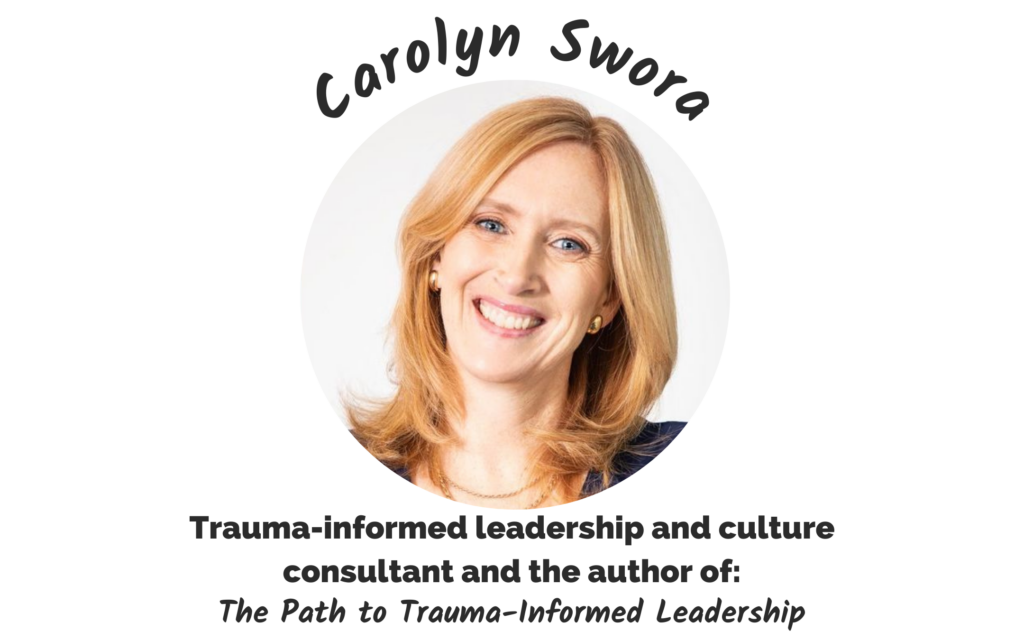In this episode of Transform Your Workplace, we sit down with Carolyn Swora, an expert in trauma-informed leadership and culture consulting. The conversation delves into Carolyn’s personal journey of supporting her husband through terminal kidney cancer and finding her way to healing after his passing. Read on to learn how leaders can embrace empathetic and human-focused strategies in their interactions with their team members.
GUEST AT A GLANCE
Carolyn Swora is a versatile professional consultant specializing in Trauma-Informed Leadership and Culture. She is Dare-to-Lead certified and is the author of Evolve: The Path to Trauma-Informed Leadership.

A QUICK GLIMPSE INTO OUR PODCAST
🔊 Podcast: Transform Your Workplace, sponsored by Xenium HR
🎙️ Host: Brandon Laws
📋 In his own words: “The Transform Your Workplace podcast is your go-to source for the latest workplace trends, big ideas, and time-tested methods straight from the mouths of industry experts and respected thought-leaders.”
THE BEGINNING OF HEALING
In the wake of the pandemic, concern arose among leaders and colleagues alike regarding the mounting toll of burnout and emotional turmoil in the workplace. The pandemic’s sweeping impact brought forth a chorus of emotions – anger, sadness, and grief. Recent guest Carolyn Swora recounted her journey through the pandemic’s turbulence, reflecting on the emotional overwhelm that became emblematic of those times.
Carolyn’s story, though, didn’t start with the pandemic. Prior to the rise of COVID-19, she navigated her husband’s six-year battle with terminal kidney cancer while caring for their children – an experience marked by both joy and grief. But Carolyn realized that she never fully confronted the grief from her husband’s health decline and eventual passing. Even as she embarked on a journey that included career successes and the founding of a school in her husband’s memory, the pandemic’s arrival eventually triggered a moment of reckoning. Swora’s realization that her coping mechanisms were inextricably intertwined with trauma prompted her to spend some time reflecting on her journey, revealing that the process of healing was only just beginning.
Through her latest book, Evolve: The Path to Trauma-Informed Leadership, Carolyn seeks to not only bring awareness about the effects of trauma in the workplace but also to inspire us to lead in “more human ways.”
PODCAST EPISODE HIGHLIGHTS
A Bigger Story
“So often, what’s right in front of us, we can’t see. And so through the guidance of a really gifted LP coach, a neurolinguistic processing coach, she kindly had said, ‘Maybe there’s something bigger here.’ And there was. Now I look back… I’m like, ‘Oh my God, of course, there was.’ And so that led me into this topic of the book, which not many people talk about in the corporate world. And I just felt like this is really where I can position and share a few things if people are willing to listen.”
Seeing the Opportunity
“Our intention and our impact are never going to align ever. […] But when you know that as a basis and just recognize the best intentions are not always going to land the way you want them to, that doesn’t mean there’s something wrong with you. It means that there’s an opportunity there. […] And then our ability to be in connection with others, our ability to see people, to hear them, to value their experience as what it is they’re sharing versus judging. Those two things, I believe, are at the core of self-awareness.”
How We Respond
“When something happens to you in your life or you’re met with struggle, some people choose to do something with that and want to learn from it. Not everybody does, and that’s okay. […] Hey, it took me many years to get to this place. That’s really, I think, the foundation of leadership. When we look at our organizations in today’s day and age, three years after that grand year of 2020 that broke the door open on a lot of things, we aren’t going to find our way through in a way that is going to see everybody for who they are and what they are until we have a level of awareness. And you’ll notice that I didn’t say who’s right and who’s wrong. It doesn’t matter what side we’re on. We can’t hear each other right now because there’s so much noise around us, and there’s just a lot of emotional heaviness that we’re not able to navigate through right now.”
It’s Nothing New
“You don’t really hear the words ‘care’ and ‘trauma’ along with a ‘corporate workplace.’ It’s sort of like, ‘Leave that at home. It doesn’t impact your work.’ The thing is… it does impact your work. And so with the pandemic happening in 2020 as sort of the key event that broke everything open, what I realized was we now have an opportunity to say, unequivocally, we’ve all been part of a collective trauma, and I felt that there was time now to introduce that word because now no one’s going to disagree.”
Creating Safe Space at Work
“Trauma-informed leadership is really about learning to create space that is safe and doesn’t activate a stress response, or a response that makes somebody feel unsafe. […] But at the core, if I’m really going to simplify it, safety is not just about a conscious feeling. It’s also about unconscious stuff that is in our bodies. And if we’re really serious, this is why I think it’s time to bring it into the workplace. If organizations and leaders are serious about living into the values, being truly inclusive and diverse, and honoring their DEI commitments, then we need to understand what trauma is, what it isn’t, and how to really truly create spaces of belonging — because we cannot get there by just thinking that we’re all fine.”
The Three-Part Connection
“An evolved leader recognizes a few things. They recognize the connection or the interconnectedness between safety, authenticity, and consistency. So one of the biggest gifts as a leader that you can give people is to have a consistent approach to how you deal with people. {…] Safety… Am I going to be judged? Can I say what needs to be said? Will that experience be honored or is it going to be judged or told it’s wrong? Creating safety means I’m gonna honor your experience for what it is and not tell you you’re wrong or not tell you something different. And then authenticity. So this is an interesting one. I don’t think we can truly find authenticity until we do a whole lot of deep self-awareness. And to me, authenticity lies in that space between perfection and imperfection.”
LEARN MORE
Find Carolyn’s new book, Evolve: The Path to Trauma-Informed Leadership, her podcast, and other valuable resources by going to her website at carolynswora.com.
